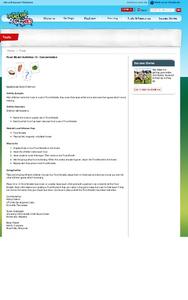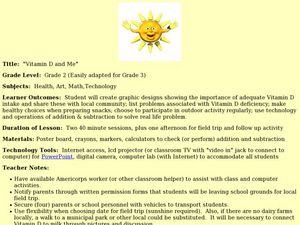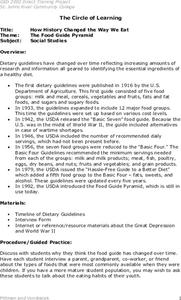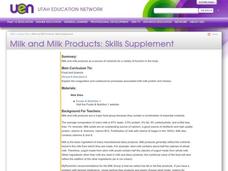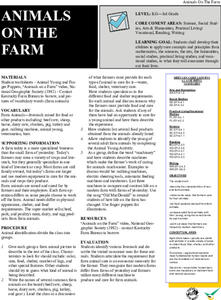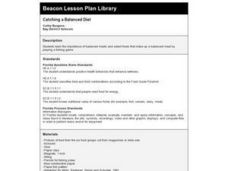Curated OER
The Five Food Groups
Students explore the five food groups as well as the specific foods found in each of these groups.
Curated OER
Fishing for Foods
Students practice using the food pyramid and know which food group familiar foods belong in.
Curated OER
Food Model Mobiles
Young scholars create mobiles that represent a day's intake or other criterion, such as healthy snacks, Milk Group foods, breakfast foods, etc.
Curated OER
Cancer
Students study cancer and possible preventative measures. In this cancer activity students study the claims on food labels and ways to lower your risk of cancer.
Utah Education Network (UEN)
Balanced Diet
Second graders investigate the concept of a balanced diet and how the food pyramid is organized. They conduct research using the links included in the instructional activity. They differentiate the parts of the pyramid while looking at...
Curated OER
Concentration
Students recognize sets of food pictures. For this food concentration lesson, students match food names and models. Students who name the most correctly win the game.
Curated OER
What's on Your Plate?
Young scholars discover foods of the Middle East. In this global studies lesson, students sample a falafel as they follow the provided instructions to make the dish.
Education World
Edible Resource Maps!
Young scholars discuss resource maps and examine examples from library resources. Working in groups, they create edible resource maps by drawing examples, such as popcorn on the border of Iowa and Nebraska. Then they use cookies in the...
Curated OER
Vitamin D and Me
Students create a graphic organizer showing the importance of Vitamin D intake. In this Vitamin D lesson plan, Students list problems with Vitamin D deficiency and create poster boards in small groups. Individually, students will create...
Curated OER
Mater Your Munchies
Students explore the various food groups while doing a physical activity.
Curated OER
How History Changed the Way We Eat
Learners participate in a lesson that is concerned with the history of the food pyramid and how it evolved and changed into its modern state. After being presented with the information they conduct classroom discussions about the research.
Curated OER
Connecting School Meals to Classroom Learning
Students examine the impact of dairy nutrients. In this nutrition lesson, students participate in interactive activities that require them to consider how much calcium their bodies need. Students also visit the school cafeteria and...
Curated OER
From Moo to You
Students listen to a story about cows and identify foods made from milk. They have a tasting party and practice a finger play called "Five Mugs of Milk."
Curated OER
Milk and Milk Products: Skills Supplement
Explain the coagulation and coalescence processes associated with milk protein and cheese. List the components of milk and explain how each component is dispersed in the milk. Describe what happens when milk protein is coagulated Discuss...
Curated OER
3-Every-Day of Dairyfor Stronger Bones
Students respond to a poll by actively moving in response to prompts. In this dairy nutrition instructional activity, students write sentences in groups using vocabulary words from a word list. Students discuss physical activity and how...
Curated OER
Animals on the Farm
Students work in groups to create a description of a farm animal. Other classmates try to guess the animal. The class discusses what farmers need to provide for each animal on their farm (food, shelter, veterinary care). Students...
Curated OER
When Something's Missing: Diagnosing Vitamin Deficiencies
The New York Times "Education" section posts an extensive lesson on vitamin and mineral deficiencies. It involves class discussion, examination of food packaging labels, and the reading of a blog post about Vitamin D. The highlight of...
Curated OER
Name That Cheese!
Students explore a variety of cheese. In this cheese lesson, students sample 4 different cheeses produced from cow's milk and recorded their observations about the cheeses prior to identifying them.
Beacon Learning Center
Catching a Balanced Diet
First graders explore the importance of balanced meals. They play a fishing game to help them select foods to make up a balanced meal.
Curated OER
Dietary Fiber
Students examine the different types of fiber and their benefits. In this investigative lesson students find good sources of fiber in different foods.
Curated OER
TIN CAN TREAT
Students conduct an experiment where they will change a liquid dairy product into a solid. They review the definitions of liquids and solids. Students are given an example of each. They are divided into groups of four, each group is...
Curated OER
A Well Balanced Meal
Pupils are given paper plates and pictures of food. They are to glue the foods they would eat that would make a balanced meal.
Curated OER
Hunger/ Nutrition
Seventh graders investigate nutrients and nutrition to determine what types of food the body needs for energy. They study each type of nutrient and why it is important to the body. They determine what a balanced diet is by completing the...
Curated OER
A Balanced Diet
High schoolers determine which healthy foods comprise a well balanced meal. Using a checklist, students classify foods as healthy or unhealthy. This lesson is intended for high schoolers acquiring English.







